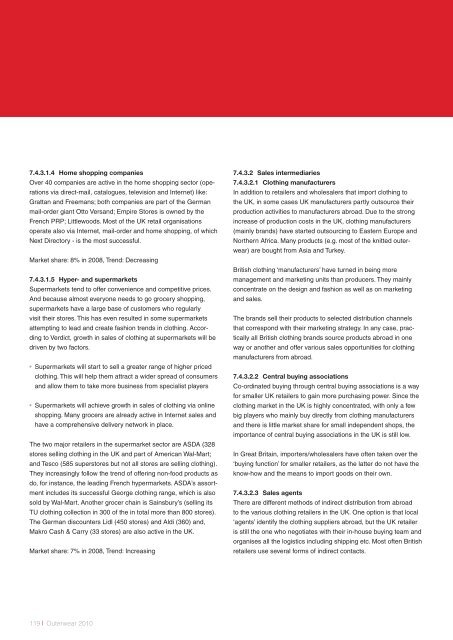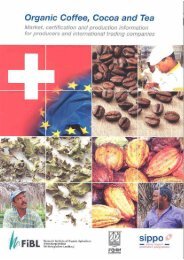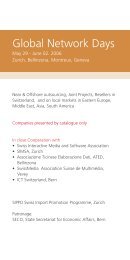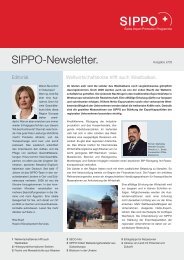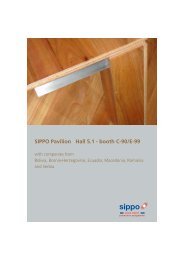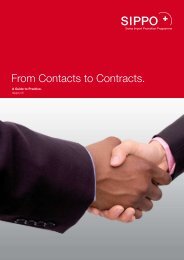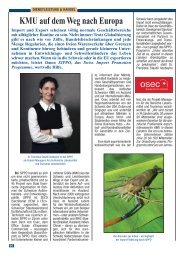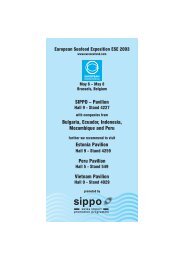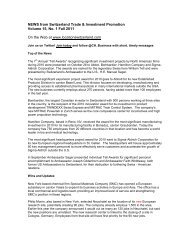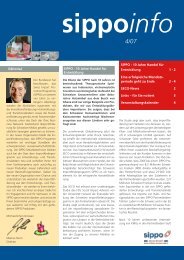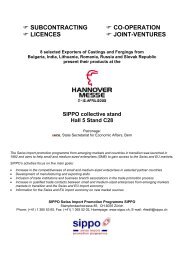Outerwear. - Business Location Switzerland
Outerwear. - Business Location Switzerland
Outerwear. - Business Location Switzerland
Create successful ePaper yourself
Turn your PDF publications into a flip-book with our unique Google optimized e-Paper software.
7.4.3.1.4 Home shopping companies<br />
Over 40 companies are active in the home shopping sector (operations<br />
via direct-mail, catalogues, television and Internet) like:<br />
Grattan and Freemans; both companies are part of the German<br />
mail-order giant Otto Versand; Empire Stores is owned by the<br />
French PRP; Littlewoods. Most of the UK retail organisations<br />
operate also via Internet, mail-order and home shopping, of which<br />
Next Directory - is the most successful.<br />
Market share: 8% in 2008, Trend: Decreasing<br />
7.4.3.1.5 Hyper- and supermarkets<br />
Supermarkets tend to offer convenience and competitive prices.<br />
And because almost everyone needs to go grocery shopping,<br />
supermarkets have a large base of customers who regularly<br />
visit their stores. This has even resulted in some supermarkets<br />
attempting to lead and create fashion trends in clothing. According<br />
to Verdict, growth in sales of clothing at supermarkets will be<br />
driven by two factors.<br />
• Supermarkets will start to sell a greater range of higher priced<br />
clothing. This will help them attract a wider spread of consumers<br />
and allow them to take more business from specialist players<br />
• Supermarkets will achieve growth in sales of clothing via online<br />
shopping. Many grocers are already active in Internet sales and<br />
have a comprehensive delivery network in place.<br />
The two major retailers in the supermarket sector are ASDA (328<br />
stores selling clothing in the UK and part of American Wal-Mart;<br />
and Tesco (585 superstores but not all stores are selling clothing).<br />
They increasingly follow the trend of offering non-food products as<br />
do, for instance, the leading French hypermarkets. ASDA’s assortment<br />
includes its successful George clothing range, which is also<br />
sold by Wal-Mart. Another grocer chain is Sainsbury’s (selling its<br />
TU clothing collection in 300 of the in total more than 800 stores).<br />
The German discounters Lidl (450 stores) and Aldi (360) and,<br />
Makro Cash & Carry (33 stores) are also active in the UK.<br />
Market share: 7% in 2008, Trend: Increasing<br />
119 l <strong>Outerwear</strong> 2010<br />
7.4.3.2 Sales intermediaries<br />
7.4.3.2.1 Clothing manufacturers<br />
In addition to retailers and wholesalers that import clothing to<br />
the UK, in some cases UK manufacturers partly outsource their<br />
production activities to manufacturers abroad. Due to the strong<br />
increase of production costs in the UK, clothing manufacturers<br />
(mainly brands) have started outsourcing to Eastern Europe and<br />
Northern Africa. Many products (e.g. most of the knitted outerwear)<br />
are bought from Asia and Turkey.<br />
British clothing ‘manufacturers’ have turned in being more<br />
management and marketing units than producers. They mainly<br />
concentrate on the design and fashion as well as on marketing<br />
and sales.<br />
The brands sell their products to selected distribution channels<br />
that correspond with their marketing strategy. In any case, practically<br />
all British clothing brands source products abroad in one<br />
way or another and offer various sales opportunities for clothing<br />
manufacturers from abroad.<br />
7.4.3.2.2 Central buying associations<br />
Co-ordinated buying through central buying associations is a way<br />
for smaller UK retailers to gain more purchasing power. Since the<br />
clothing market in the UK is highly concentrated, with only a few<br />
big players who mainly buy directly from clothing manufacturers<br />
and there is little market share for small independent shops, the<br />
importance of central buying associations in the UK is still low.<br />
In Great Britain, importers/wholesalers have often taken over the<br />
‘buying function’ for smaller retailers, as the latter do not have the<br />
know-how and the means to import goods on their own.<br />
7.4.3.2.3 Sales agents<br />
There are different methods of indirect distribution from abroad<br />
to the various clothing retailers in the UK. One option is that local<br />
‘agents’ identify the clothing suppliers abroad, but the UK retailer<br />
is still the one who negotiates with their in-house buying team and<br />
organises all the logistics including shipping etc. Most often British<br />
retailers use several forms of indirect contacts.


